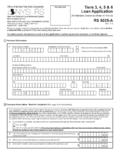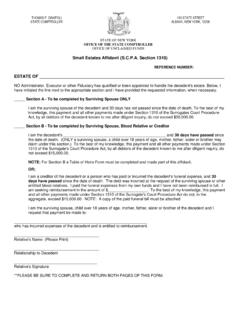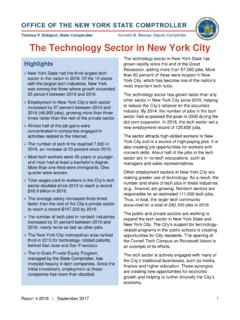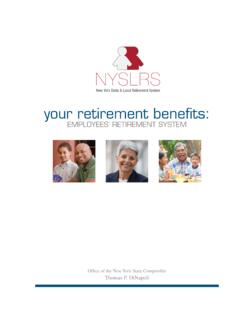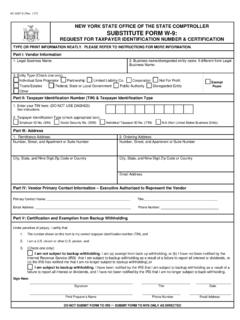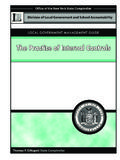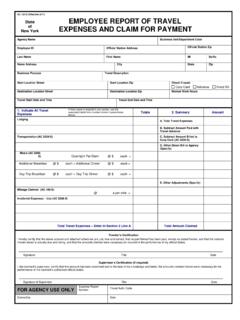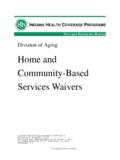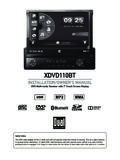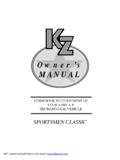Transcription of State of New York Office of the State Comptroller …
1 State of New York Office of the State Comptroller travel manual Prepared by: Division of Contracts and Expenditures Bureau of State Expenditures Revised: 12/14/2015. TABLE OF CONTENTS. travel POLICY STATEMENT .. 1. GENERAL GUIDELINES AND RESPONSIBILITIES .. 1. AGENCY RESPONSIBILITY .. 2. SUPERVISOR'S RESPONSIBILITY .. 2. TRAVELER'S RESPONSIBILITY .. 3. OFFICIAL STATION .. 3. DETERMINING travel STATUS .. 3. travel IN PROXIMITY OF OFFICIAL STATION OR HOME .. 4. REIMBURSEMENT 4. OVERNIGHT travel REIMBURSEMENT .. 4. UNRECEIPTED METHOD (METHOD 1) .. 4. RECEIPTED METHOD (METHOD 2).
2 5. DAY TRIP REIMBURSEMENT .. 6. MEALS AND LODGING PROVIDED BY AGENCY .. 6. WEEKEND ALLOWANCE .. 6. MISCELLANEOUS EXPENSES .. 6. REIMBURSABLE EXPENSES .. 7. NONREIMBURSABLE EXPENSES .. 7. CONFERENCE CONSIDERATIONS .. 7. FOREIGN travel .. 7. EXTENDED travel .. 8. TRANSPORTATION .. 8. COMMON CARRIER .. 9. PERSONAL 9. State VEHICLE .. 10. RENTAL VEHICLE .. 10. travel BY PERSONALLY OWNED AIRPLANE .. 10. ADDITIONAL TRANSPORTATION EXPENSES .. 10. travel CARD PROGRAM .. 11. travel ADVANCES .. 11. RECEIPT REQUIREMENTS .. 12. IRS REQUIREMENTS .. 12. INTERVIEWS FOR EMPLOYMENT.
3 13. COMMISSIONERS AND CERTAIN SENIOR OFFICIALS .. 13. DAY TRIP REIMBURSEMENT .. 14. CERTIFICATION OF EXPENSE 14. NON-SALARIED PUBLIC 14. DAY TRIP REIMBURSEMENT .. 14. Office of the State Comptroller - travel manual travel Policy Statement The purpose of this travel manual is to help agencies, employees and certain public officials understand and apply the State 's travel rules and regulations and to provide instructions regarding reimbursement for expenses while in travel status. The Office of the State Comptroller sets rules and regulations for reimbursement of expenses incurred while traveling on official State business.
4 These rules and regulations are also included by reference in collective bargaining agreements. When an employee travels on official State business, only actual, necessary and reasonable business expenses will be reimbursed. Employee reimbursements are processed and paid through the Employee Expense function in the Statewide Financial System (SFS), and non-employee expenses are processed through the Accounts Payable (AP). function. As discussed in more detail in this manual , the State of New York has a travel Card Program ( travel card) to provide State employees with a mechanism to pay for travel expenses.
5 In conjunction with the implementation of SFS, the Office of General Services (OGS) created the Non- Employee travel Card (NET-Card), which is used for non-employee travel expenses. NET-Card transactions are reconciled through the SFS AP function and should not be used for employee travel expenses. OGS has posted additional information on the set-up and maintenance of NET-Card accounts. A State procurement card should be used when making State purchases of goods and services not related to employee or non-employee travel . For more information related to the appropriate use of an agency issued procurement card, refer to the Citibank Procurement Card Guidelines.
6 General Guidelines and Responsibilities Employees are in travel status when they are more than 35 miles from both their official station and their home (defined in the Official Station Section of this manual ). The designation of official station will be determined by agency management in the best interest of the State and not for the convenience of the employee. The Comptroller 's Office reserves the right to request justification from an agency to support its designation of official station. Official station designation relates to the position, not to the person ( , a full-time employee working for one agency in one position will have only one official station; a part-time employee working for two agencies in two different positions will have two official stations).
7 travel between the employee's home and official station is considered commuting and should not be reimbursed. Reimbursing commuting costs can have significant tax consequences for the employee (please refer to the Guide to Financial Operations Chapter XIII, Section 6 for more information). Expense reports should be submitted within 30 days of the end of the travel event to account for all expenses, reimburse the traveler for out-of-pocket expenses and reconcile the associated agency travel card charges. Employees are still required to submit expense reports to account for all expenses even if they miss the 30-day submission window.
8 Agencies should check OGS contracts for the type of travel -related services available. Currently, OGS has contracts for car rentals, air travel , and centralized travel agent services, both statewide and regional. travel agents may charge a transaction fee for various services. You can obtain more information on these contracts through the OGS web site. Page 1 of 14. Office of the State Comptroller - travel manual Agency Responsibility Ensure: all authorized travel is in the best interest of the State . all expenses are actual, reasonable and necessary.
9 The most economical method of travel is used in the best interest of the State . compliance with Internal Revenue Service (IRS) regulations. the official station of each employee is designated in the best interest of the State . Where it is not the employee's usual work location, ensure proper tax reporting consistent with the Guide to Financial Operations Chapter XIII, Section 6. employees obtain appropriate approvals prior to traveling, and exceptions or waivers are justified and necessary. adequate funds are available for travel . all travel card charges are reconciled correctly.
10 Any overpayments or improper charges are recovered promptly. all expenses comply with the State Comptroller 's rules and regulations, this travel manual , the Guide to Financial Operations and policies published by oversight agencies such as the Division of the Budget and the Governor's Office of Employee Relations. if the agency processes expense reports through OGS's Business Service Center (BSC), all expenses comply with BSC requirements. original receipts are maintained in accordance with State Archives and Records Administration guidelines. Establish: an agency-specific policy related to travel procedures when employees are in travel status.
